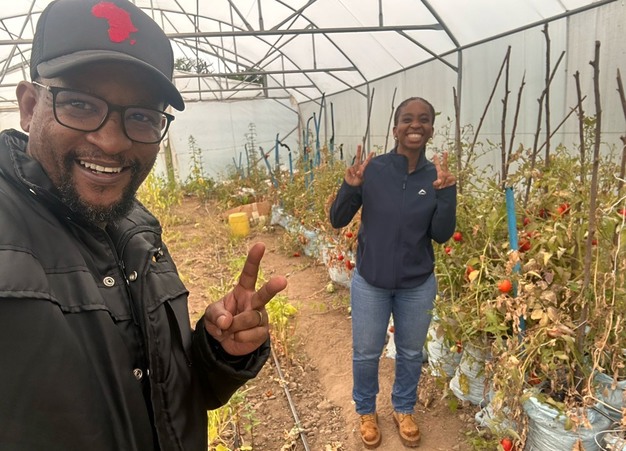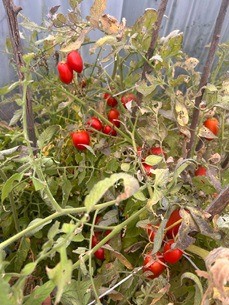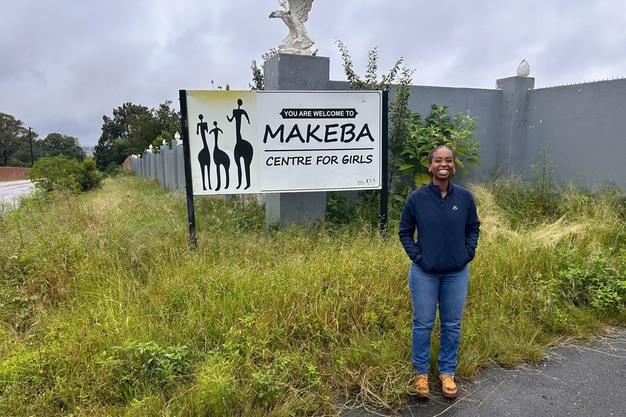Like Sleeping Beauty's castle choked by weeds, the centre set up by singer Miriam Makeba in Midrand, Johannesburg for young women removed by the state from perilous home situations was beset by neglect after her passing.
Determined not to let her legacy drain away, The Makeba Centre for Girls' board has approached the South African national chapter of the World Food Forum to assist in revitalizing what's left of the original five greenhouses. One of the recently refurbished greenhouses will be cleaned and the long grass and shrubs on the terrain cut down.
Astonishingly, remarks Palesa Motaung, founder of Bread Africa and member of the World Food Forum South Africa National Chapter, tomatoes and melons are still clinging on to life in the greenhouse.
 Tshiamo Dichabe, board member of the Miriam Makeba Foundation with Palesa Motaung
Tshiamo Dichabe, board member of the Miriam Makeba Foundation with Palesa Motaung
"There are two greenhouses left in which the girls at the centre grew spinach and tomatoes. One is in fairly good condition due to the contributions by Meals on Wheels Community Services South Africa (MOWCS SA) to refurbish it and will be cleaned out while replacing its irrigation pipes, which seem worn out. The second greenhouse needs a lot of work and the other three, which were sadly burned down, will need to be re-erected as the actual structures are still in good condition. The other three greenhouses are irreparable and we are hoping to raise funds for their refurbishment." The transfer of agricultural skills, along with those in the arts, was one of the foundations on which Makeba donated the funds for the centre which in its heyday housed sixteen girls and young women between the ages of six and eighteen, who were given assistance into employment afterward.
The transfer of agricultural skills, along with those in the arts, was one of the foundations on which Makeba donated the funds for the centre which in its heyday housed sixteen girls and young women between the ages of six and eighteen, who were given assistance into employment afterward.
Right: astonishingly, tomatoes and melons are still clinging on to life in the greenhouse.
Things started falling apart after Makeba's passing when a weak governing board let the centre slide, explains Palesa Motaung, founder of Bread Africa and member of the World Food Forum South Africa National Chapter. The centre racked up gigantic electricity and water debts and eventually, the Department of Social Development, who had referred the young women to the centre in the first place and paid stipends for each, closed it down for poor compliance in 2018.
Negotiations with the Departments of Social Development and Agriculture have restarted to bring the entire project back online. Eskom has promised a resumption of services in exchange for payment of a fraction of the original bill.
The World Food Forum is contributing expertise and volunteers to help rehabilitate the Centre's agricultural projects specifically. This aligns with the National Chapter's mandate to lobby and engage youth in agriculture. The aim is to revive the greenhouses and other agricultural enterprises on the property such as the orchard that has 50 fruit trees donated by Standard Charted towards the Kae Hustlers' Women Cooperative, keeping livestock and growing indigenous crops.
"The strategic intent of the World Food Forum South Africa National Chapter is to create a platform for young women at the centre to engage on the aspect of food security and providing food, income, and learning opportunities to girls at the Centre, but also to students and locals who can learn more about agriculture from the Centre. That is the goal of the WFF National Chapter," she says. "The newly appointed board of the Miriam Makeba Centre for Girls requires funds to take this first little step on a big longer journey."
For more information:
Palesa Motaung
BreadAfrica
Tel: +27 68 338 4540
Email: palesa@breadafrica.co.za
